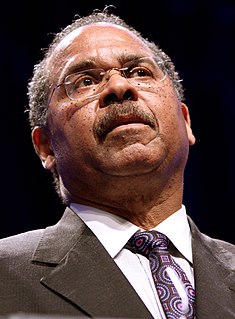A Quote by Stephen Holmes
In Madison's famous formulation in the Federalist, constitutional restrictions on government assume that we "first enable the government to control the governed." If the public authorities can be outgunned or bribed, the vibrancy of the private sector can be pathological.
Related Quotes
If men were angels, no government would be necessary. If angels were to govern men, neither external nor internal controls on government would be necessary. In framing a government which is to be administered by men over men, the great difficulty lies in this: you must first enable the government to control the governed; and in the next place oblige it to control itself. A dependence on the people is, no doubt, the primary control on the government; but experience has taught mankind the necessity of auxiliary precautions.
When people abuse these freedoms to enrich themselves at the expense of others, then the public will demand the government to step in. That is how government grows, and how freedom is diminished.... When financial meltdowns occur, the public's outrage drives government to take over part of the private sector. When the government does so, it replaces irresponsible executives with unaccountable bureaucrats. That takes us out of the frying pan and into the fire.
70 to 80 percent of country economy is controlled by the Bolivian state, and the other percentage by the private sector. We admit that it's legal, constitutional, that the private sector is entitled to its own economy, but to ensure these profound changes that clearly this government is promoting, including profound changes in the food industry, what we are doing is an important step.
If you look at the fact that the best chance we have for a good economy is the private sector. The government cannot create jobs. If the government could create jobs, then Communism would have worked. But didn't work. So what we have to do is allow the private sector and the entrepreneurial spirit to lead us back to a job-filled recovery.



































